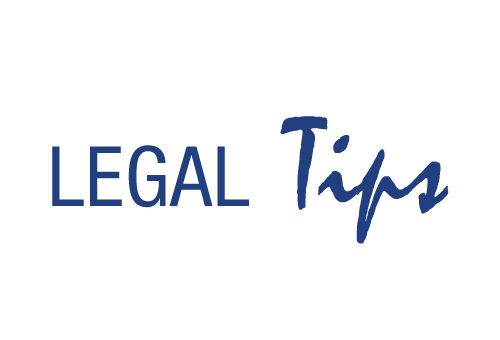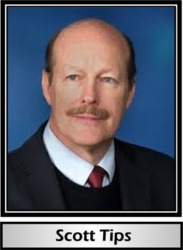Editor’s Note: This article is intended for information purposes only. Because state and municipal laws vary greatly, as do the circumstances of individual cases, readers are advised to contact an attorney for specific legal advice. © Scott C. Tips 2015
It all began innocently enough. I was asked by one of our National Health Federation (NHF) board members if he could draft a write-up about NHF and post it with Wikipedia, the website that had all-too-quickly become the “go to” site for anyone and everyone seeking information about anything. It seemed that even judges were citing Wikipedia as absolute authority in court opinions and yet we had no entry at all for NHF. So, of course I said yes. He dutifully drafted up a marvelous entry that was very even-handed, described NHF very neutrally but fairly, and then posted it. We thought no more about it.
Some time later, many months later, someone asked NHF why our Wikipedia listing was so negative about the organization and its members. Surprised to hear this, we went to the Wikipedia page and saw that our original posting had been radically altered. It now portrayed us in a very bad light. Many references had been removed and in their place were anti-NHF and anti-natural health references.
When we attempted to change the entry back to its original wording, the attempt was rejected in short order and the negative entry reinstated. Attempt after attempt to correct the entry resulted in the same failure. NHF then hired an attorney to try to succeed where it had failed. Yet, after two failed attempts, where her entries were replaced within an hour, she finally received a threatening notice telling her to cease and desist her efforts “or else.” It was not clear what the “or else” would be.
To this day, the Wikipedia entry for the NHF still disparages the organization with such negative, one-sided, opening entries as “The NHF was founded by Fred J. Hart in 1955, after he was ordered by the U.S. Food and Drug Administration to cease marketing fraudulent radionics devices.2 Mainstream medical organizations have criticized the NHF for promoting dubious alternative cancer treatments and health claims; the American Cancer Society recommends that cancer patients avoid products promoted by the NHF,2 while Quackwatch describes the NHF as ‘antagonistic to accepted scientific methods as well as to current consumer-protection law. ”3
It doesn’t matter that Wikipedia falsely republishes the incorrect claim that the NHF promotes products or that NHF is antagonistic to “accepted” scientific matters.
Wikipedia, the Gateway Media Drug
Wikipedia has been touted by some as the people’s encyclopedia, a collaborative effort where anyone and everyone can submit his or her own entries or edits to entries in the encyclopedia. Begun in 2001, the English-language site is given premiere status by the Google search engine and appears at the top, or almost at the top, of almost every Google search. There is not a person reading this article who has not, at one time or another, consulted or read a Wikipedia entry. As of 2013, it was the sixth most widely used website in the world.1
On its “Wiki:About” page, Wikipedia unabashedly brags that it is unbiased. “Wikipedia,” it reads, “is open to a large contributor base, drawing a large number of editors from diverse backgrounds. This allows Wikipedia to significantly reduce regional and cultural bias found in many other publications, and makes it very difficult for any group to censor and impose bias.”
One of Wikipedia’s so-called five pillars strives to bolster this claim when it states, “Wikipedia is written from a neutral point of view: We strive for articles that document and explain the major points of view, giving due weight with respect to their prominence in an impartial tone. We avoid advocacy and we characterize information and issues rather than debate them. In some areas there may be just one well-recognized point of view; in others, we describe multiple points of view, presenting each accurately and in context rather than as ‘the truth’ or ‘the best view’.”
In reality, though, there are editors and these editors most definitely have biases that are reflected in the Wikipedia entries. Even Larry Sanger—one of Wikipedia’s co-founders, who left Wikipedia in part because of his concerns over its lack of reliability and accuracy—admitted that “[a]n article can reflect the bias of a few people who just happen to be most motivated to work on it. This is a general problem with Wikipedia: What is praised as consensus decision-making or crowd-sourcing often just means that the person with the loudest voice or the most time on his or her hands is the one who's going to win.”2 He has also been reported as saying “In some fields and some topics, there are groups who ‘squat’ on articles and insist on making them reflect their own specific biases.”
Investigative journalist Sharyl Attkisson would agree, calling Wikipedia “astroturf’s dream come true.” “Astroturfing,” according to Attkisson, is any fake grassroots movement funded by political, corporate or other special interests that very effectively manipulate and distort media messages. In her brilliant 10-minute TEDx talk, Attkisson vivisects not only the manipulation fostered by Wikipedia but also in the general media.3 Front groups with impressive names are created by drug companies to endorse drug solutions to health problems that will coincidentally also benefit those companies’ bottom line. I myself see the same type of front groups aplenty populating Codex Alimentarius meetings around the world. Their names—such as Crop Life for Monsanto—provide just enough veneer to disguise to the non-discerning viewers their true purpose.
So, too, with Wikipedia. In our experience at NHF—an experience shared by many others in the alternative-health and health-freedom communities—there are individuals who sit on these sites and quickly change into negatives any and all positive information entered into the listing. Attkisson spoke of edits being promptly changed back, even within seconds of the edits having been made. That was also NHF’s experience, although not in seconds.
Some have argued that these Wikipedia trolls are paid by the pharmaceutical industry to monitor Wikipedia and other websites, blogs and Internet forums so as to “manufacture consent” for the dominant drug paradigm and to ridicule, harass and stamp out any dissenting views. Whether this is true or not, the fact is that some very energetic persons are targeting us as an industry and, sometimes, as individuals. And with Wikipedia at the top of the Google searches, Wikipedia becomes the quick and easy gateway fix to mainstream conformity about medicine and health.
Alternative-Medicine Entries Are Targeted
Jonathan Collin, M.D., of the Townsend Letter, recounted his own, negative experience with Wikipedia, where only a brief mention was made of his publication, with a statement about it not containing factual information and a Quackwatch jab as a “not-recommended publication.”
As Dr. Collin states, “Given the open editing policy of Wikipedia, we decided that our stub listing should be edited to include discussion about the evidence-based review articles written by naturopathic physicians and medical doctors. In November 2013, we made two attempts to edit the Townsend Letter listing. In the first editing, we did not omit the defamatory statements noted above; instead we added two sentences regarding our authors, review articles, and citations from the literature. The sentences were successfully added. However, within 10 minutes, the edited discussion was removed and the original listing was in place. A second attempt to edit the listing led to similar results.”4
Meanwhile, others have been denigrated as well. Well-known and-respected medical doctor Jonathan Wright has been given short shrift by Wikipedia,5 as have EFT (Emotional Freedom Techniques)6 and homeopathy in general.7 Even Wikipedia’s entry on vitamin supplements (redirected to “Multivitamins”) discourages consumers from taking supplements with account after account of studies that found no benefits to health from taking supplements.8
In fact, just look at Wikipedia’s entry on “alternative medicine” and you will see the inherent bias: “Alternative medicine is any practice that is perceived by its users to have the healing effects of medicine, but does not originate from evidence gathered using the scientific method, is not part of biomedicine, or is contradicted by scientific evidence or established science.”9 But the Wikipedia entry just gets worse. “Promoting alternative medicine,” it says, “has been called dangerous and unethical.”
Ironically, it is Wikipedia that is dangerous and unethical. By using its pre-eminent visibility through Internet search engines, widely read Wikipedia discourages people who have not been helped by mainstream medicine from seeking help from the alternative-health community.
Courts Are Conflicted Over Its Use
In light of Wikipedia’s demonstrated lack of neutrality and obvious biases, it would be frightening indeed if courts were to consider and use Wikipedia as a source of information for their decisions. Unfortunately, many courts do. Of the Federal courts, the Seventh and Ninth Circuit Courts of Appeals were the most usual citers of Wikipedia as authority.10 But, fortunately, many judges are smart enough to know better than to consider Wikipedia established authority on anything. Three years ago, the Fourth Circuit Court of Appeals reversed criminal convictions when it was discovered that a juror had consulted Wikipedia to research an element of the crime.11 Similarly, the Eighth Circuit Court of Appeals rejected Wikipedia as a legitimate basis for any court’s holding, reasoning, or logic.12
But not all courts are as judicious and circumspect as the Fourth and Eighth Circuits. As of late 2009, Wikipedia has been cited in more than 400 cases.13 Yet, most of those citations violated the requirements of Federal Rule of Evidence 201 because the Wikipedia entries are disputable and their accuracy can be reasonably questioned.14
Another problem that judges face when using Wikipedia is the Model Code of Judicial Conduct, Rule 2.9(C), which forbids judges from conducting their own independent research on a case before them. Not only jurors, but judges are also taking quick looks at Wikipedia to help them decide cases. The prohibition against this practice dovetails with legal precedence holding that judges should not use unreliable sources such as Wikipedia when more authoritative sources exist.15 Still, the temptation to take a quick look at Wikipedia must be far stronger than is ever actually reported as happening.
The Cure for Wikipedia Is the Same As That for Any Drug
Go cold-turkey. Boycott it. Don’t click on it or feed it in any way. And shine light on its bias every chance you get. Copy this article and distribute it.
Wikipedia has shown particularly nasty tendencies to paint alternative and complementary medicine, as well as those who challenge the dominant, drug-happy medical paradigm, in the worst possible light. Attempts to reform Wikipedia on these topics, even with individual entries, have been futile. As shown above with the NHF entry, the derogatory text keeps reverting back any time we try to change it. The Wikipedia-sitting shills control and there is no sense in wasting our energy and time beating our heads against the wall there. Move on to alternative sites—such as Scholarpedia or Infoplease—and convince everyone you know to stop clicking for any reason on Wikipedia ever again.
You wouldn’t give your business to a doctor who believes in drugging every illness, would you? Or in buying your groceries at a store that not only didn’t sell whole and nutritious foods, but also actively warned its customers against buying such foods? Of course not. So, the next time you are online and  are tempted to click on any Wikipedia link, resist the urge. Click elsewhere and stop feeding the mainstream monster that attacks and maligns us all. WF
are tempted to click on any Wikipedia link, resist the urge. Click elsewhere and stop feeding the mainstream monster that attacks and maligns us all. WF
A graduate of the University of California at Berkeley Law School, Scott C. Tips currently practices internationally, emphasizing Food-and-Drug law, business law and business litigation, trade practice, and international corporate formation and management. He has been involved in the nutrition field for more than three decades and may be reached at (415) 244-1813 or by e-mail at scott@rivieramail.com.
End Notes
1 Tom Simonite, “The Decline of Wikipedia,” MIT Technology Review, October 22, 2013, at http://www.technologyreview.com/featuredstory/520446/the-decline-of-wikipedia/.
2 Kathryn Schulz, “This Interview is a Stub: Wikipedia Co-founder Larry Sanger on Being Wrong,” Slate, July 26, 2010, at http://www.slate.com/blogs/thewrongstuff/2010/07/26/this_interview_is_a_stub_wikipedia_co_founder_larry_ sanger_on_being_wrong.html. See also Larry Sanger, “Why Wikipedia Must Jettison Its Anti-Elitism,” KURO5HIN, Dec. 31, 2004, at http://www.kuro5hin.org/story/2004/12/30/ 142458/25.
3 Sharyl Attkisson, “Astroturf and Manipulation of Media Messages,” TEDx University of Nevada, February 6, 2015, at https://www.youtube.com/watch?v=-bYAQ-ZZtEU.
4 Jonathan Collin, M.D., “Wikipedia Gives the Townsend Letter a Thumbs Down,” Townsend Letter, March/April 2014, at http://www.townsendletter.com/FebMarch2014/ltrpub0214.html.
5 Ibid.
6 Dawson Church, “Fixing Wikipedia’s ‘EFT’ Article, EFT, undated, at http://www.eftuniverse.com/research-and-studies/wikipedia-s-bias-against-science-in-natural-healing.
7 Dana Ullman, “Dysfunction at Wikipedia on Homeopathic Medicine,” Huffington Post, October 10, 2014, at http://www.huffingtonpost.com/dana-ullman/dysfunction-at-wikipedia-_b_5924226.html.
8 Wikipedia, “Multivitamins,” at https://en.wikipedia.org/wiki/Multivitamin.
9 Wikipedia, “Alternative Medicine,” at https://en.wikipedia.org/wiki/Alternative_medicine.
10 Joe Palazzolo, “Which Federal Appeals Court Cites Wikipedia The Most Often?,” The Wall Street Journal Law Blog, April 23, 2012, at http://blogs.wsj.com/law/2012/04/23/which-federal-appeals-court-cites-wikipedia-most/.
11 Ibid.
12 Badasa v. Mukasey, 540 F.3d 909, 910 (8th Cir. 2008).
13 Lee F. Peoples, “The Citation of Wikipedia in Judicial Opinions,” 12 Yale Journal of Law and Technology 1 (2010).
14 Ibid. at p.28.
15 Ibid. at p.29. For example, a court should not consult Wikipedia for a definition when the definition can be found in Black’s Law Dictionary
Published in WholeFoods Magazine, August 2015, (online 7/16/2015)










